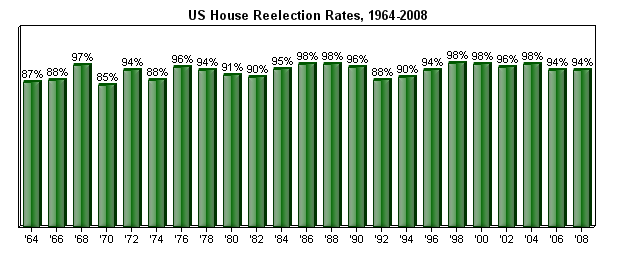This blog is intended to make you think . . . think about how you vote in federal, state and local elections, and here’s an item that should get your attention. In October 2008, a few weeks before the elections, national polls indicated that “We The Voters” gave our Congress a 10% to 15% job approval rating. Then, in November “We The Voters” went to the polls and re-elected 95% of them right back into office. In any other (non-government) organization in the world an across-the-board 10% job approval rating would likely result in 95% of the group being demoted or fired. But in the U.S. Congress 10% approval equals 95% re-elected . . . it’s a mystery.
So, I went looking for information and found the chart shown below. It’s an eye-opener. Since 1964 “we the voters” have always re-elected 85% to 98% of the incumbent House members. I’m old enough to remember all those years, and I can say without reservation that Congress’s approval rate was never above mediocre. And yet, despite wide-spread incompetence, corruption and failure to perform, come election time,”We The Voters” march into the voting booth and faithfully vote for the same good-ole-boy to whom we just gave a 10% job approval rating without it ever entering our minds that he/she could be part of the problem.
So, having given this a fair amount of thought I am making the prediction that despite our unprecedented level of dissatisfaction with Congress, Tea-Parties (which I attend), 9-12 groups, Glenn Beck, etc., etc. “We The Voters”, in November, will once again re-elect 85% to 90% of our incumbent congressmen – thus assuring that NOTHING WILL CHANGE.
This has been happening every election for decades, and here’s why I think it’s about to happen again.
1. GERRYMANDERED POLITICAL DISTRICTS – Designed to allow a politician to tailor his re-election campaign to a very narrow segment of society.
Electoral districts are gerrymandered into groups of like-minded people with similar political party affiliations, ethnic backgrounds, religious affiliations, family circumstances, finacial circumstances, education level, entertainment preferences, web-browsing favorites . . . and every other thing they can learn about us via the census, tax returns Social Security records, Medicare records, the mass of personal data on the Internet, assorted polls and who knows what else. This means that the vast majority of voters in a given candidate’s district are overwhelmingly inclined to have the same political outlook and to vote the same way. All the candidate has to do is position himself in the middle of this majority. Presto! Re-election is nearly guaranteed.
2. SENIORITY BASED POWER STRUCTURE IN THE CONGRESS – A play-along to get-along, seniority based power structure in Congress secures re-election for incumbents.
The power base in congress is built on seniority. Those who have held office for years have lots of power over newly elected members. Those who have held office for decades have immense power throughout the entire government – federal, state and local. New congressmen who arrive in office with their integrity intact, their heads on straight and their ethics in the right place soon find that they must serve the party line. They must vote on legislation the way the party leaders instruct them to vote or suffer the consequences. The consequences are: They get no support or approval for their treasured earmarks, no important committee memberships, certainly no committee chairmanship, no attention (i.e. money) from lobbyists, no re-election support from influential congressional members or party leaders and no campaign funds from the party coffers or the powerful special interest groups. A new member of Congress will toe the party line or he/she has little chance of being re-elected.
3. PROFESSIONAL POLITICIANS – A social class of professional politicians who by definition must put re-election above all else in their career.
Our U.S. Congress is owned by professional politicians, and the most critical over-riding priority for professional politicians has nothing to do with performance in office. It is re-election. They must win re-election or they will be failures in their chosen career. Every meeting, every vote on the floor, every speech, every hand-shake, every step of every day and every night is viewed through their re-election campaign scope. Will it help gain re-election? Will it be detrimental to re-election? It is always the first question that must be answered before any action is taken.
. . . more in the next post.

